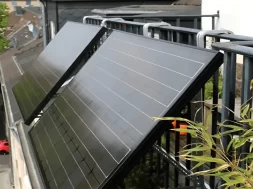
UAE solar capacity to increase fourfold by end of 2025 thanks to ‘robust’ development pipeline
The United Arab Emirates (UAE) is capable of reaching its renewable energy targets thanks to a “robust” development pipeline of solar projects, new research from Rystad Energy suggests.
Installed solar PV is expected to increase fourfold from now to the end of 2025, increasing from its 2.1GW level to reach 8.5GW, when it will represent around 94% of the country’s renewables capacity.
The UAE is aiming to increase the contribution of clean energy in its energy mix to 50% by 2050, a target that Rystad said is “well within reach”, thanks in part to low power purchase agreement prices secured for projects and the “resilience and determination” shown by the country’s renewables sector amid COVID-19.
“Renewable energy seems to be a top priority in the UAE,” said Gaurav Metkar, senior analyst at Rystad Energy. “Despite the COVID-19 shock, the government has provided a reasonable amount of investment to continue ongoing projects. UAE has already attracted big international players in the renewable sector – a healthy sign for future business.”
Among the seven emirates that make up the UAE, most of the renewables activity is concentrated in Abu Dhabi and Dubai, which Rystad predicts will together account for more than 90% of capacity in 2025.
Four solar projects, which are all at various stages of development, are expected to drive this growth: the Al Dhafra (2GW), Abu Dhabi PV3 (1.5GW), and the fourth (950MW) and fifth (900MW) Phases of the Mohammad bin Rashid Al Maktoum (MBR) solar facility.
The MBR plant is said to be the world’s largest single-site solar installation, with a planned total capacity of 5GW when fully operational by 2030. A deal announced last month by utility Dubai Electricity and Water Authority will see some solar power from the plant used to produce aluminium.
In the Emirate of Sharjah, meanwhile, Masdar is planning to deploy a 120MW solar farm on on a 47-acre landfill, a project that the developer hopes will become a benchmark for other landfills in the region.
While the UAE works to complete its project pipeline, Abu Dhabi-headquartered Masdar has ambitious international expansion plans, entering the US solar market last year and announcing plans to work on renewables projects in Israel. The company has also formed a joint venture to drive the development of a 145MWac floating solar park in Indonesia.
















